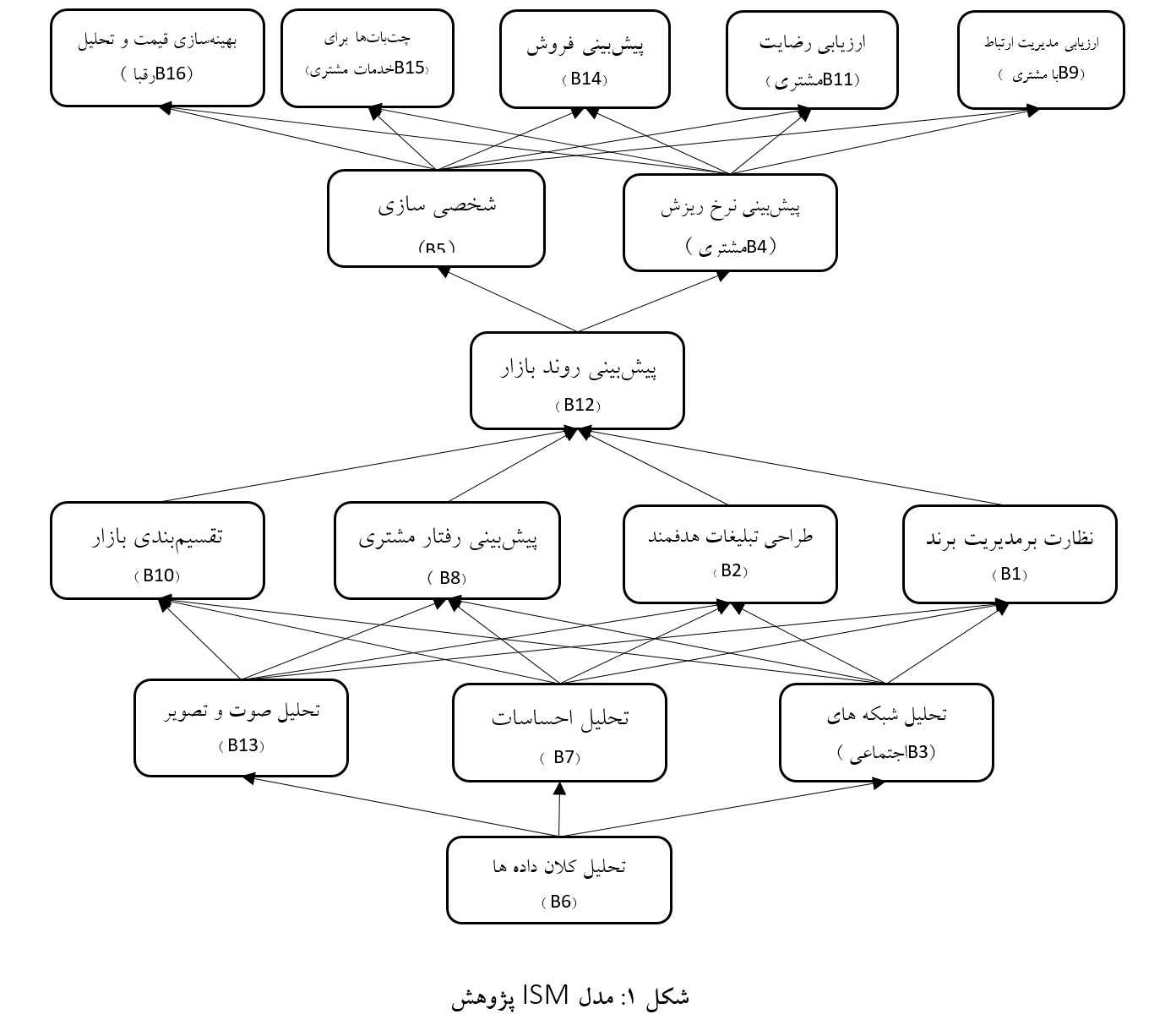طراحی مدل ساختاری -تفسیری کاربردهای هوش مصنوعی در فرآیند بازاریابی بین المللی(مورد مطالعه: صنعت مواد غذایی)
چکیده
هوش مصنوعی با تحول آفرینی در تحلیل دادهها و شخصیسازی محتوا، به ابزاری استراتژیک در بازاریابی بینالمللی تبدیل شده و با سرعت چشمگیری در حال تغییر رویکردهای سنتی بازاریابی است. هدف اصلی این پژوهش، شناسایی کاربردهای هوش مصنوعی در بازاریابی بر اساس مراحل فرآیند بازاریابی و سپس اولویتبندی آنها با در نظر گرفتن تأثیر و تاثر متقابل آنها بر یکدیگر و ایجاد یک سلسلهمراتب بود. برای شناسایی عوامل مرتبط از ادبیات تحقیق استفاده شده است. برای این منظور، از یک روش تحقیق ترکیبی (کیفی-کمی) استفاده شده است. در بخش کیفی، بر شناسایی عوامل تأکید شده و در بخش کمی، به سطحبندی و رتبهبندی آنها پرداخته میشود. پارادایم این پژوهش تفسیری، نوع آن کاربردی و استدلال آن ترکیبی از قیاسی و استقرایی است. استراتژی تحقیق نیز پیمایشی است. جامعه آماری این پژوهش را خبرگان بهترین برندهای صنعت مواد غذایی ایران تشکیل میدهند. از این جامعه، 15 نمونه انتخاب و مورد تحلیل قرار گرفتند. برای تحلیل دادهها و روابط علی و معلولی بین متغیرهای موثر بر کاربرد هوش مصنوعی در فرآیند بازاریابی بینالمللی صنعت مواد غذایی، از مدل ساختاری-تفسیری (ISM) استفاده شد. دادهها بر اساس پرسشنامهای ویژه گردآوری و با استفاده از روش ISM تحلیل شدندنتایج حاصل از تجزیه و تحلیل دادهها که شامل ۱۶ کاربرد منتخب میباشد، منجر به ایجاد شش سطح سلسلهمراتبی گردید. در این سلسلهمراتب، سطح ششم که شامل معیار تحلیل کلان دادهها است، تاثیرگذارترین سطح بوده و سطح یکم که شامل ارزیابی رضایت مشتری، پیشبینی فروش و ... میشود، متأثر از سایر سطوح(تاثیرپذیرترین) است. همچنین، معیار پیشبینی روند بازار در سطح سوم به عنوان نقطه عطف این مدل شناخته شده است. با استفاده از این مدل، میتوان به درک عمیقتری از تأثیر متقابل این اجزا دست یافت و در نتیجه، استراتژیهای موثرتر و کارآمدتری برای بهبود عملکرد در صنعت مواد غذایی طراحی نمود. با توجه به اهمیت روزافزون هوش مصنوعی در حوزه بازاریابی و نقش کلیدی آن در افزایش بهرهوری و رقابتپذیری شرکتها در بازارهای بینالمللی، نتایج این پژوهش میتواند به عنوان یک راهنمای ارزشمند برای مدیران و تصمیمگیران در صنایع مختلف، به ویژه صنعت مواد غذایی، مورد استفاده قرار گیرد.

چاپ شده
ارسال
بازنگری
پذیرش
شماره
نوع مقاله
مجوز
حق نشر 2025 فرامرز کاظمی, نیما رحمانی, عادل پورقادر چوبر (نویسنده)

این پروژه تحت مجوز بین المللی Creative Commons Attribution-NonCommercial 4.0 می باشد.






